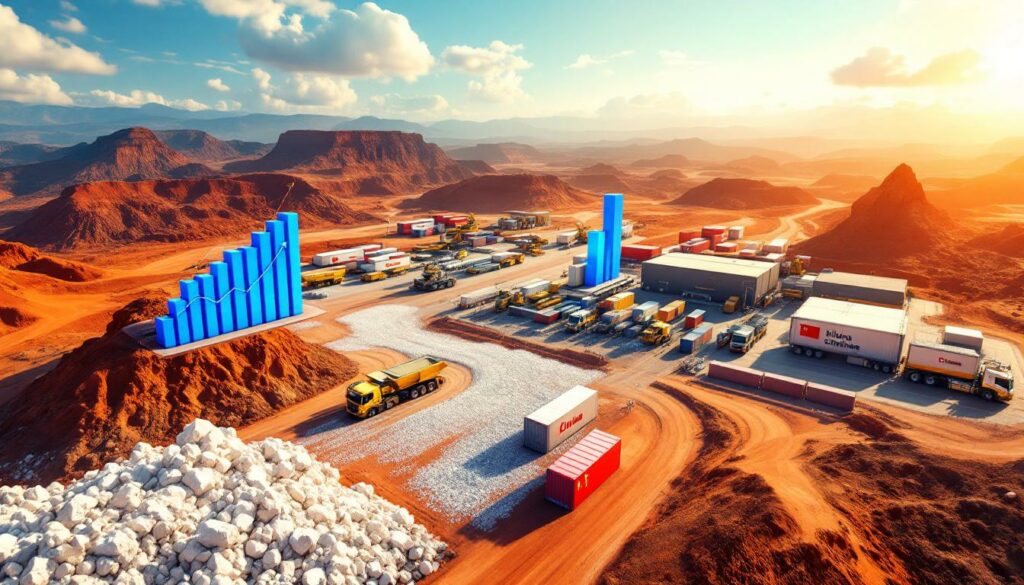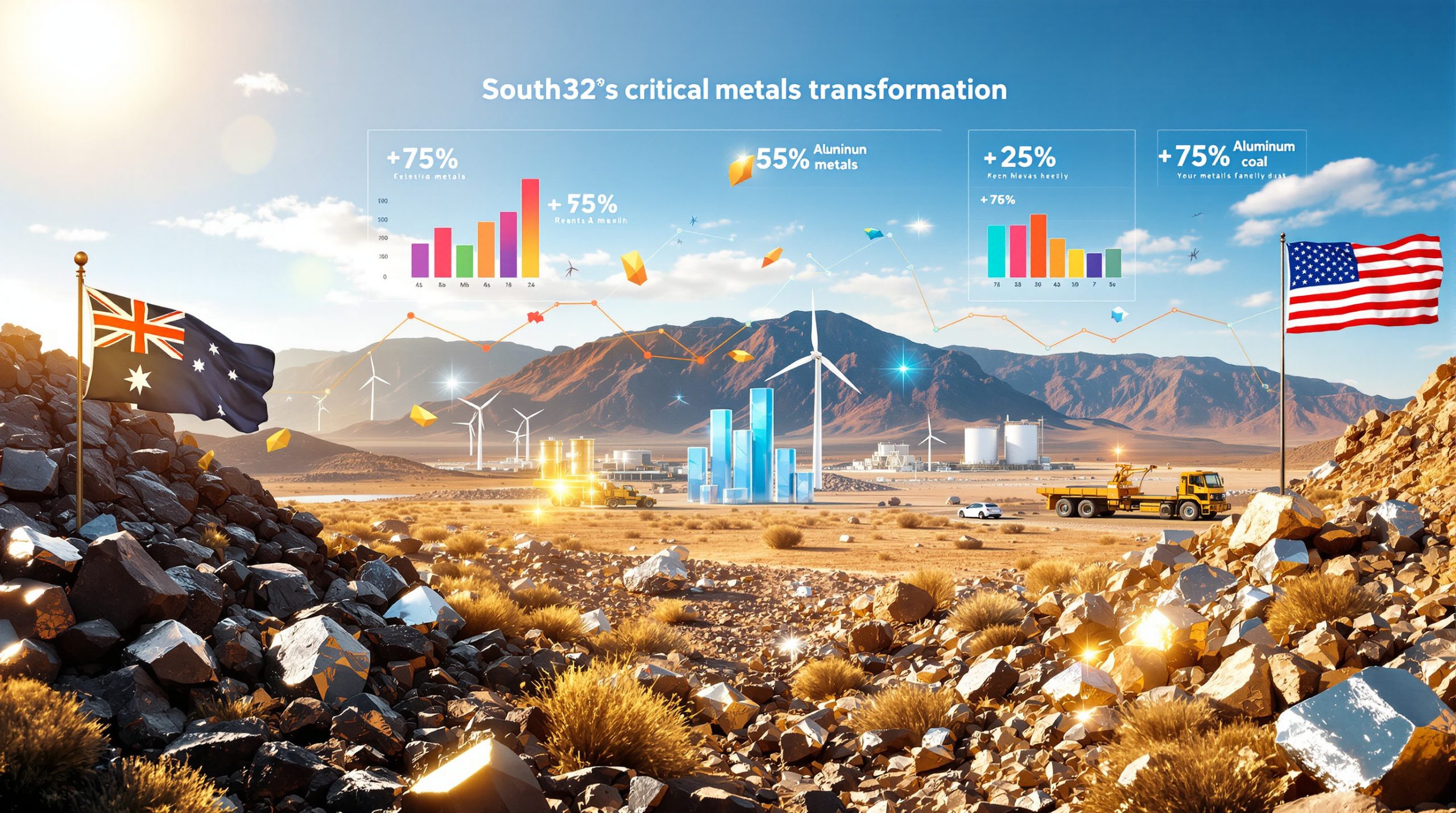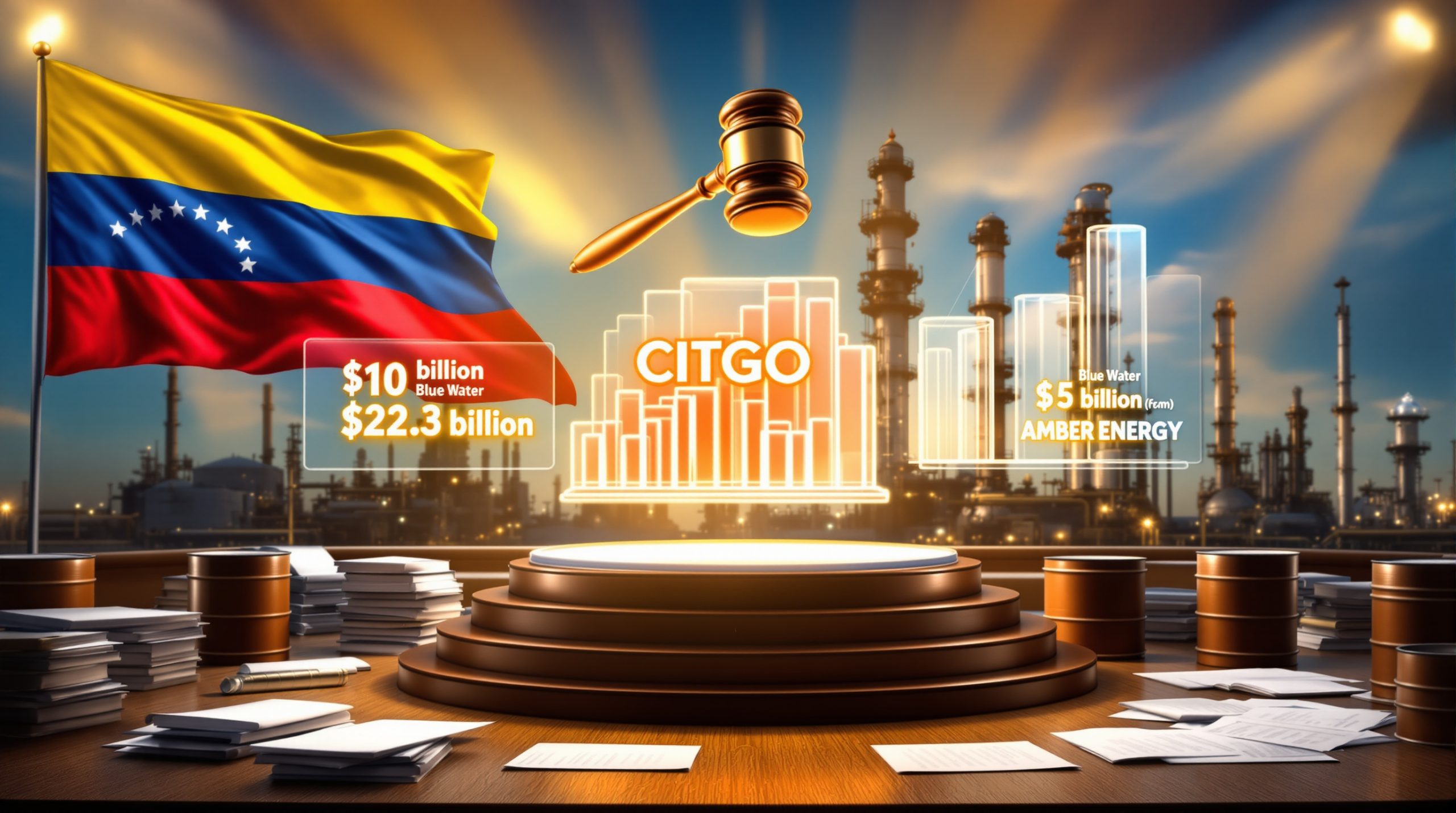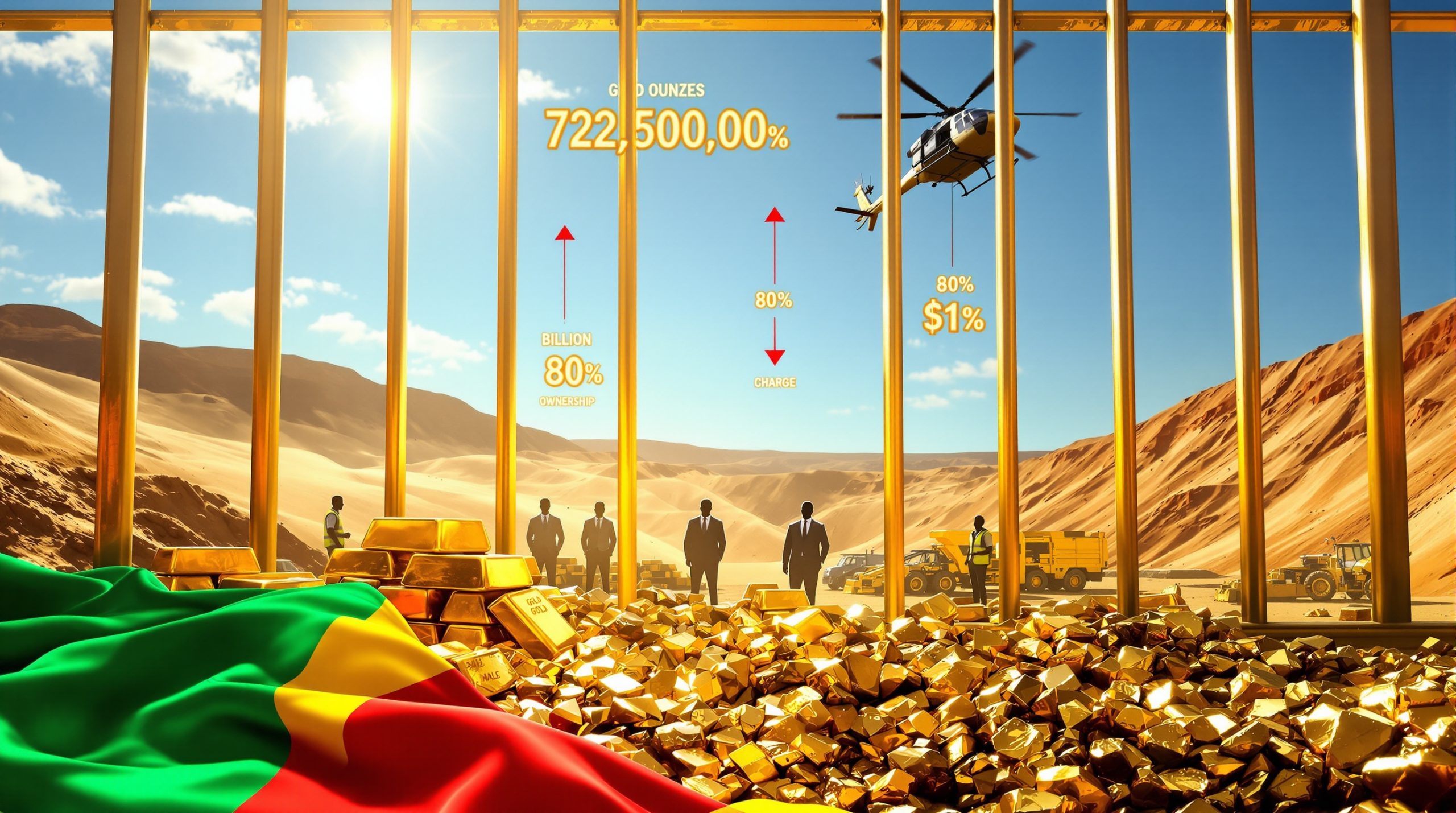Zimbabwe's Lithium Boom: How Spodumene Exports Grew 30% Despite Market Challenges
Zimbabwe has emerged as Africa's leading lithium producer, with spodumene concentrate exports increasing by 30% in the first half of 2025 despite a challenging global market. This remarkable growth contradicts current market conditions, where lithium prices have declined significantly over the past two years. The country's strategic position in the global lithium supply chain, coupled with substantial Chinese investment, has created a unique scenario where zimbabwe and spodumene exports surge 30% despite weak lithium prices even as prices fall.
According to the Minerals Marketing Corporation of Zimbabwe (MMCZ), the country exported 586,197 tonnes of spodumene concentrate in H1 2025, compared to 451,824 tonnes during the same period in 2024. This substantial increase highlights Zimbabwe's growing importance in the global lithium supply chain, particularly as a critical supplier to China's dominant battery manufacturing sector.
What's Driving Zimbabwe's Surprising Lithium Export Growth?
The paradoxical growth in Zimbabwe's lithium exports amidst falling global prices can be attributed to several interconnected factors. Chinese mining companies have invested over $1.4 billion since 2021 to develop Zimbabwe's lithium resources, enabling rapid scaling of mining operations and export infrastructure.
These investments have focused on high-grade spodumene deposits, which typically contain 6-7% lithium oxide (Li₂O) content—significantly higher than many competing sources globally. The superior quality of Zimbabwe's lithium resources has made them particularly attractive to Chinese battery manufacturers seeking reliable supply chains.
"Zimbabwe's spodumene deposits feature exceptional mineralogical characteristics that reduce processing costs downstream," notes the MMCZ in its latest minerals report.
The strategic importance of these resources has prompted Chinese companies to continue expanding production despite current price challenges, positioning themselves for anticipated medium-term market improvements.
Key factors driving Zimbabwe's lithium export growth include:
- Strategic long-term positioning by Chinese companies seeking supply chain security
- High-grade ore quality reducing overall production costs
- Significant infrastructure investments improving mining efficiency and export logistics
- Vertical integration strategies connecting Zimbabwean mines directly to Chinese battery manufacturers
How Has Zimbabwe Positioned Itself in the Global Lithium Market?
Zimbabwe's emergence as a lithium powerhouse stems from strategic partnerships with Chinese mining companies and significant foreign investment. The country has leveraged its mineral resources to attract major players in the battery metals sector, establishing itself as a critical supplier in the global lithium value chain.
Five major Chinese companies have established dominant positions in Zimbabwe's lithium sector:
- Zhejiang Huayou Cobalt – Leading producer with extensive operations at the Arcadia mine
- Sinomine Resource Group – Operating the historic Bikita Minerals mine
- Chengxin Lithium Group – Developing multiple exploration projects
- Yahua Group – Strategic investor in various lithium assets
- Tsingshan – Diversifying from nickel into lithium resources
These investments align with China's broader strategy to secure critical mineral supplies for its dominant battery manufacturing industry, which currently produces over 80% of the world's lithium-ion batteries, according to BloombergNEF data.
Zimbabwe's government has actively facilitated these partnerships through favorable investment policies, while simultaneously introducing regulations to ensure domestic mineral beneficiation opportunities in the future.
Why Are Lithium Prices Falling While Demand Rises?
The lithium market presents a fascinating contradiction: prices have plummeted by nearly 90% over the past two years despite rising global demand for electric vehicles and energy storage systems. This disconnect between price and demand highlights the complex dynamics affecting the lithium market globally.
"A notable market contradiction was observed in the lithium sector, where prices declined despite a continuous rise in demand for lithium metal," stated the MMCZ in its most recent market analysis. "Lithium prices are, however, expected to improve in the medium-term."
This price decline stems from several interrelated factors:
- Production capacity expansion outpacing near-term demand growth
- Strategic stockpiling during previous high-price periods creating inventory buffers
- Temporary slowdowns in EV adoption rates in some markets (particularly Europe)
- Production efficiency improvements reducing extraction and processing costs
- Market speculation amplifying price volatility
Benchmark lithium carbonate prices in China fell from over $80,000 per tonne in late 2022 to approximately $14,000 per tonne by mid-2025—a decline that has challenged producers worldwide but hasn't deterred ongoing investments in high-quality resources like those found in Zimbabwe.
What Role Does Huayou Cobalt Play in Zimbabwe's Lithium Sector?
Zhejiang Huayou Cobalt has emerged as the dominant force in Zimbabwe's lithium industry, with significant export volumes and ambitious plans for vertical integration through downstream processing facilities.
The company exported approximately 400,000 tonnes of lithium concentrate from Zimbabwe in 2024, according to MMCZ data, representing nearly half of the country's total lithium exports. This massive scale of operations underscores Huayou's strategic commitment to Zimbabwean resources.
More significantly, Huayou is currently constructing a 50,000-tonne per year lithium sulphate plant in Zimbabwe—a critical step toward higher-value production. This facility represents a strategic move up the value chain, as lithium sulphate is an intermediate product that can be further refined into battery-grade lithium refinery materials such as lithium hydroxide or lithium carbonate.
Huayou's integrated approach includes:
- Mine-to-battery strategy connecting Zimbabwean resources directly to Chinese battery manufacturers
- Technology transfer initiatives developing local expertise in advanced processing techniques
- Infrastructure investments improving power supply and transportation logistics
- Long-term supply agreements with major EV manufacturers
This vertical integration strategy allows Huayou to capture more value across the lithium supply chain while securing critical resources for China's dominant battery industry.
How Will Zimbabwe's Ban on Raw Lithium Exports Transform the Industry?
Zimbabwe has announced plans to ban the export of unprocessed lithium concentrates starting in 2027, a policy aimed at promoting domestic value addition and capturing more of the lithium value chain within the country. This strategic decision is already reshaping investment decisions and accelerating plans for processing facilities.
The upcoming export ban has triggered several significant developments:
- Sinomine's $500 million investment in a lithium sulphate plant at its Bikita mine
- Huayou's accelerated timeline for its 50,000-tpy lithium sulphate facility
- Increased focus on skills development and technology transfer programs
- Expanded infrastructure planning to support processing operations
These investments will transform Zimbabwe from a mere supplier of raw materials into a producer of higher-value lithium products, potentially increasing export revenues significantly while creating higher-skilled employment opportunities.
The policy reflects a broader trend among resource-rich countries to capture more value from their mineral wealth through beneficiation requirements. For Zimbabwe specifically, the transition to lithium sulphate production represents a crucial step toward industrial development and economic diversification.
What Makes Lithium Sulphate Production a Strategic Priority?
The development of lithium sulphate production capacity represents a strategic shift for Zimbabwe's lithium industry, moving beyond raw material exports toward higher-value products with significant economic advantages.
Lithium sulphate serves as an intermediate product in the battery materials supply chain, offering several key benefits compared to raw spodumene concentrate:
- Higher value per tonne (approximately 3-4× the value of raw concentrate)
- Reduced transportation costs due to higher concentration of valuable lithium content
- Lower impurity levels simplifying further processing into battery-grade materials
- More flexible application in various battery chemistry production flows
From a technical perspective, lithium sulphate production involves the chemical processing of spodumene concentrate to extract and convert the contained lithium into a water-soluble compound. This process removes silica and other impurities, creating a more versatile product that can be more efficiently converted into battery-grade lithium hydroxide or carbonate.
For Zimbabwe, developing this capability represents a crucial step in capturing more value from its mineral resources while building technical expertise in chemical processing operations.
How Does Zimbabwe Compare to Other Global Lithium Producers?
As Africa's top lithium producer, Zimbabwe has established itself as an important player in the global lithium market, though it still trails behind the world's largest producers in terms of total output.
The following table illustrates Zimbabwe's position relative to other major lithium-producing countries:
| Country/Region | Production (2024) | Reserve Base | Key Advantages | Challenges |
|---|---|---|---|---|
| Australia | ~680,000 tonnes LCE | 7.9 million tonnes | Established operations, stable jurisdiction | Higher production costs, remote locations |
| Chile | ~210,000 tonnes LCE | 9.2 million tonnes | Low-cost brine operations, large reserves | Water concerns, community relations |
| China | ~180,000 tonnes LCE | 5.1 million tonnes | Integrated supply chain, processing dominance | Depleting domestic resources |
| Argentina | ~130,000 tonnes LCE | 6.8 million tonnes | Expanding brine operations | Political/economic volatility |
| Zimbabwe | ~95,000 tonnes LCE | 1.2 million tonnes | High-grade resources, growing infrastructure | Power challenges, policy evolution |
Zimbabwe's competitive advantage lies primarily in the quality of its hard rock lithium deposits, which feature exceptionally high lithium oxide (Li₂O) content compared to many global competitors. This natural advantage translates to lower processing costs and higher-quality concentrate, particularly valuable for battery applications requiring high purity.
While Zimbabwe currently lacks the production scale of Australia or the low-cost brine operations of South America, its rapid growth trajectory and strategic positioning for value-added processing could significantly enhance its global market position in the coming years.
What Are the Long-Term Prospects for Zimbabwe's Lithium Industry?
Despite current price challenges, the long-term outlook for Zimbabwe's lithium sector remains positive, supported by global trends toward electrification and renewable energy adoption.
Several fundamental factors underpin the long-term growth potential:
- Accelerating global EV adoption with major markets mandating transitions away from internal combustion engines
- Expanding energy storage applications supporting renewable energy integration
- Supply chain diversification efforts by manufacturers seeking to reduce geopolitical risks
- Zimbabwe's high-grade resources providing cost advantages in production
The International Energy Agency (IEA) projects global lithium demand could increase by 40-fold by 2040 in a sustainable development scenario, far outpacing current production capacity. This long-term demand outlook suggests that current market oversupply conditions are likely temporary, with prices expected to rebalance as demand catches up to expanded production capacity.
For Zimbabwe specifically, the development of domestic processing capabilities will enhance the country's resilience to price volatility while capturing more value from its resources. The MMCZ has noted this potential, stating that "lithium prices are expected to improve in the medium-term" as market dynamics stabilize.
How Are Chinese Companies Shaping Zimbabwe's Lithium Future?
Chinese companies have emerged as the dominant force in Zimbabwe's lithium sector, controlling most major mining operations and export channels while driving investments in processing infrastructure.
This dominance reflects China's broader strategy to secure critical minerals needed for its leadership position in global battery and EV manufacturing. Chinese firms have invested more than $1.4 billion in Zimbabwe's lithium sector since 2021, establishing controlling positions throughout the value chain.
Key elements of this strategic approach include:
- Vertical integration connecting Zimbabwean mines directly to Chinese battery producers
- Technology transfer initiatives building local processing capabilities
- Infrastructure development enhancing extraction and transportation efficiency
- Long-term supply agreements securing resources for decades
While this investment has accelerated the development of Zimbabwe's lithium resources, it also raises questions about resource sovereignty and value capture. Zimbabwe's 2027 ban on raw lithium exports represents an effort to balance these concerns by ensuring domestic value addition while maintaining investment attractiveness.
The evolving relationship between Zimbabwe and Chinese mining companies will significantly influence the country's ability to leverage its lithium resources for broader economic development while navigating complex geopolitical considerations. Companies globally are exploring similar approaches, as seen with the Thacker Pass lithium mine in the US and Australia lithium innovations that aim to strengthen domestic supply chains.
FAQs About Zimbabwe's Lithium Industry
Why is lithium important for the global economy?
Lithium is a critical component in batteries that power electric vehicles and renewable energy storage systems. As the world transitions to cleaner energy sources, demand for lithium is expected to grow substantially. The metal's unique electrochemical properties make it ideal for high-energy-density batteries, with few viable alternatives currently available at commercial scale. This strategic importance has elevated lithium to "critical mineral" status in many countries' resource strategies.
How does spodumene concentrate differ from other lithium products?
Spodumene concentrate is derived from hard rock mining and typically contains 6-7% lithium oxide (Li₂O). It requires further processing through conversion plants to produce battery-grade materials like lithium hydroxide or carbonate. This differs from lithium extracted from brines (salt flats), which follows a different production process involving evaporation and chemical precipitation. Hard rock resources like Zimbabwe's spodumene deposits generally enable faster production scaling but with higher operating costs compared to brine operations.
What challenges does Zimbabwe face in developing its lithium industry?
Zimbabwe faces several significant challenges in maximizing the value of its lithium resources:
- Infrastructure limitations, particularly unreliable electricity supply for processing operations
- Technical expertise gaps in advanced chemical processing
- Water management concerns for processing facilities
- Policy consistency questions affecting long-term investment decisions
- Environmental management requirements for sustainable development
Addressing these challenges will be crucial for Zimbabwe to fully capitalize on its lithium potential while ensuring sustainable development.
How might the 2027 export ban affect global lithium markets?
The ban could potentially reduce the global supply of raw lithium concentrate while increasing the availability of partially processed materials like lithium sulphate. This policy may accelerate vertical integration in the industry and potentially influence pricing dynamics for different lithium products. For Zimbabwe, the ban represents a calculated risk—potentially sacrificing short-term export volumes for longer-term value addition. The success of this strategy depends largely on companies' willingness to invest in processing facilities ahead of the deadline.
What environmental considerations are important for Zimbabwe's lithium mining?
Sustainable water management, energy use, and land reclamation are critical environmental considerations for Zimbabwe's lithium industry. Hard rock lithium mining requires significant water resources for processing, potentially competing with agricultural and community needs in some regions. Energy requirements for processing operations also present challenges in a country facing electricity supply constraints. As the industry grows, implementing best practices for environmental management—including tailings disposal, water recycling, and rehabilitation planning—will be essential for long-term sustainability and maintaining social license to operate. Some companies are exploring direct lithium extraction technologies to reduce environmental impacts.
Ready to Invest in the Next Major Mineral Discovery?
Discovery Alert instantly notifies investors of significant ASX mineral discoveries using its proprietary Discovery IQ model, helping you identify opportunities before the broader market. Understand why historic discoveries can generate substantial returns by visiting Discovery Alert's dedicated discoveries page and begin your 30-day free trial today.




